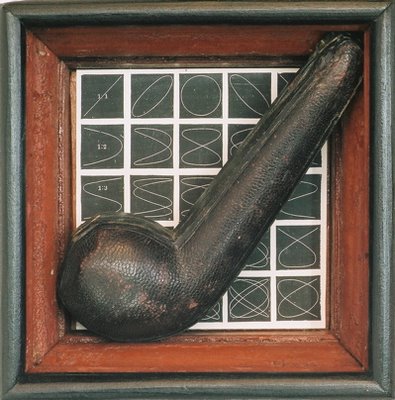 Johann Dieter Wassmann, HARMONISCH 1895. 145 x 145 x 70 mm.
Johann Dieter Wassmann, HARMONISCH 1895. 145 x 145 x 70 mm.Last week I focused on the composer Hugo Wassmann's involvement with the Guild of Funerary Violinists and the Mizler Society, a theme I don't want to leave just yet, so this week I thought I'd open by looking at the impact of music on Johann Dieter Wassmann's boxed works. Maime Stombock makes the point in her essay, "A Carpenter's Tale," that it was Johann’s friendship with the physicist Max Planck, and their mutual interest in the epistemology of music, that in many ways directed his thinking:
"The late night dialogues Johann records between himself and Planck more often than not centered around music. But then, he was a Leipziger: Wagner, Mendelssohn, Strauss, Liszt, Schumann, Brahms, Grieg, Mahler, they all spent crucial years in the city (as well as in Weimar) during the course of Johann’s life, allowing him to come in contact with each, as well as to see all but Wagner and Schumann either conduct or perform. It would be impossible to overstate the importance of music in his work, despite there being only a handful of direct musical references in his boxes.
"For Johann, music and only music could create such an idealization of space as to transcend time, while still existing within it as an undivided whole. Music is at once truth and form, knowledge and sensation. Music defies absolute space and time by not only transcending the boundaries, but by suggesting the very boundlessness of the universe itself.
"Another to have passed through Leipzig—in this case on his way to Vienna—was Sigmund Freud. In Freud, Johann found his journey had come full circle. Where Johann had begun by challenging his students to question the veracity of truth through his enigmatic displays on human physiology, he ended by proffering that truth is neither supreme nor absolute; our universe may be governed by laws, he suggests, but truth resides just outside our reach, amidst the deepest dark corners of a world we have only just begun to unravel: that of the human mind."
READ MORE
Thanks foor this blog post
ReplyDelete